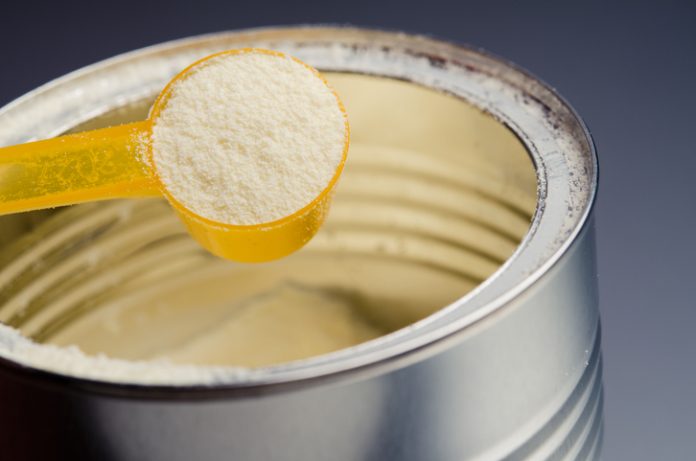The baby formula shortage has forced parents to spend hours online or going from store to store to find enough formula to feed their infants and toddlers, and retailers have limited how much customers can buy.
The shortage stems from a recall on February 17 of several popular brands of powdered baby food after two babies died and four got sick after ingesting formulas linked to the manufacturing facility operated by Abbott Nutrition in Sturgis, Michigan. The infants were infected by Cronobacter, a rare bacterium that can be deadly to infants. The plant was temporarily closed.
The Food and Drug Administration (FDA) and the Centers for Disease Control and Prevention (CDC) did not find the deaths and illnesses were caused by Abbott’s products.
“[A] comprehensive investigation by Abbott, FDA, and CDC found no evidence that our formulas caused infant illnesses,” Abbott tweeted on May 13.
The plant has since reopened and Abbott says it will begin production on some of its products around June 20.
Meanwhile, the Biden administration has been trying to ease the shortage by invoking the Defense Production Act to speed up domestic production and import foreign supplies.
Biden Caught Unaware
A contamination issue at one manufacturing facility caused nationwide market disruption in the world’s largest economy, but did not affect other developed countries, says Kim Corba, D.O., a family medicine specialist in Allentown, Pennsylvania.
“It is interesting how a shortage has not impacted other developed countries,” said Corba. “The contamination issue in the U.S. was known for months. How is it that nothing was being done with the potential of a plant shutdown? Wasn’t there some recognition of how much this particular plant was contributing to the supply chain?”
President Joe Biden, speaking at a media event on June 1, said the shortages caught officials by surprise, writes Philip Wegmann at RealClearPolitics.
“I don’t think anyone anticipated the impact of the shutdown of one facility,” said Biden.
Biden said he did not know how serious the formula shortage was until April, says Wegmann, but baby formula manufacturers at the event said they knew the plant shutdown would cause shortages.
“Robert Cleveland, senior vice president for North American operations of the Reckitt Co. … said he told Biden that ‘we knew from the very beginning this would be a very serious event,’” wrote Wegmann. “Murray Kessler, CEO of Perrigo Company, told Biden that as soon as his company heard about the recall ‘we could foresee that this was going to create a tremendous shortage.’ The other manufacturers present said the same, and yet the president admitted he wasn’t made aware of the gravity of the crisis until last month.”
FDA ‘Abdicates Its Responsibility’
The FDA and CDC were aware of problems at the plant as early as September, after health officials in Minnesota alerted them about the death of an infant, according to Politico.
In October, a whistleblower sent a 34-page document to health officials alleging the Abbott facility falsified records and failed to test formulas and keep the facility clean.
The last FDA inspection of the plant was in September 2019, wrote William D. Marler, a lawyer who specializes in food-borne illnesses, in the New York Post on May 10.
“The FDA has essentially been silent on what it failed to do, but more importantly, what it plans to do to prevent the next Cronobacter outbreak,” said Marler. “Instead, the FDA facing formula shortages, abdicates its responsibility to protect the public by letting parents know they are on their own with this thin gruel of a warning: ‘Those seeking access [to the formula] should consult with their health care provider in considering whether the benefit of consuming such product outweighs the potential risk of bacterial infection in the user’s particular circumstances.’”
Potential Health Effects
Families could resort to desperate measures if they can’t find enough baby formula, pediatrician Roberta Bobal-Savage, M.D., told Health Care News.
“Should the shortage be protracted, we may have a generation of small adults,” said Savage. “It is likely that malnutrition in the young years leads to shorter stature as we age and may impair intellectual development. But it is reasonable to predict that if formula shortages are prolonged and babies are either underfed or parents try to make their own, nutritionally inferior formulas, then you will see more failure-to-thrive infants, which can definitely lead to developmental delays and long-term concerns of not reaching their full potential.”
Government Dominates Market
The largest U.S. purchaser of infant formula is the Special Supplemental Nutrition Program for Women, Infants, and Children (WIC), says Doug Badger, a senior fellow at The Heritage Foundation’s Center for Health and Welfare Policy and at the Galen Institute.
“For me, the most obvious issue is that WIC requires states to contract with a single supplier of infant formula,” said Badger. “That supplier, in turn, must provide the state with rebates. This gives the states a cheap rate and erects a barrier to market entry that limits the number of incumbents and grants them a state-sponsored monopoly. This Cuban-style approach to markets works until it doesn’t. Contamination at one production facility creates a national crisis.”
Three manufacturers account for 98 percent of all U.S. baby formula sales, according to an analysis by the U.S. Department of Agriculture published in 2011: Abbott, Mead Johnson, and Nestle. The report states that in 2007, California changed its WIC supplier from Abbott to Mead Johnson and, within one year, Abbott’s market share in California dropped from 95 to 5 percent.
This is not been the first time there has been a baby formula shortage, says Badger.
“Congress might want to rethink the design of the WIC program,” said Badger. “It might find that competition is the best way to balance supply and demand.”
The nationwide shortage will ease within two months, FDA Commissioner Robert Califf told a Senate panel on May 26.
AnneMarie Schieber (amschieber@heartland.org) is the managing editor of Health Care News.
This article was updated on June 8.



















